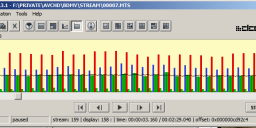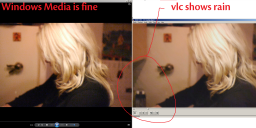
-
My workflow to do denoising is: 1-convert original mts to cineform avi using neoscene. 2-denoise with neatvideo using cineform neoscene codec to save the denoised file as cineform avi. 3-convert the denoised cineform avi to the format i need, for example h264 or mp4 to upload to web or mpeg2 to output to dvd.
I did some new tests to compare denoising in two ways and i found no significant difference in image quality: 1- original mts to denoised h264 2- original mts to cineform avi to denoised cineform avi to h264 so it seems you do not need to use the intermediate codec to get good denoise if your output is H264.
But, if your output is a DCP (digital cinema package) using cineform codec is a must because the denoised cineform avi file is much much better than the h264 denoised video. The difference is more noticeable in the shadows, in low light, in gradients, near the blacks and no light areas. the h264 compression hurts the video quality a lot.
the neatvideo tutorial is here (read the video description on vimeo for important updated informations):
-
hack settings: 48 / 24 Mbps Gop6. problem still there in 1080 and 720, 48 or 24 Mbps. changing datarate does not affect the problem at all. it seems lowering the gop to 6 the problem is a little more subtle, but not sure about that. will try new settings.
interesting: the problem does not show in sunlight shoots, just inside home at less light.
-
Only viable testing is changing ONE parameter, not whole settings.
Most probably your decoder issue is related to custom matrixes, not to GOP.
-
Hi Vitaliy, thanks for the input, a little bit late, after the solution, but thanks anyway...
I changed only one parameter, just gop6 to gop3 and problem was solved... so i think gop3 was the solution. the important point now is: "i found the solution!"
is custom matrixes a feature to change or set it in the ptool? or is it a decoder feature?
thanks.
-
I got a reply from Cineform Support. they did play the original hacked mts file i provided and they saw the problem. they told me they license from MainConcept, a high quality decode tools, and probably this is not a decoder issue. So in this moment the advice for hack users is to use the GOP3 to avoid this problem.
-
I was not able to get rid of the rain with GOP3. Did you try it on Flowmotion? Maybe I am changing the wrong setting.
-
@DrDave In my hack settings in Ptools I just enabled iso 12800, change datarate to 48Mbps, and gop to GOP3, nothing more, and problem was solved.
-
Anything over GOP3 coupled with unequal shutter speeds (iA modes does this too) for the frame rate produces unbalanced b frames on the GH2 and could be one of the reasons responsible for digital rain where certain decoders cannot decode the mts file correctly.
Long gop seems more prone to these problems.
Strangely, anything which does show unequal b framesis where odd shutter value ratios to frame rate are employed (see graph example attached) and these often play as rain in VLC and CS6 (Sony Vegas too I believe) whilst Elecard products, ffdshow (libavcodec codec plugins), Windows Media Player / Classic and a few others play things without problems.
However, since it appears to be happening to some GOP3 stuff the investigation continues...

 shutter speed - how it looks on the graph.png771 x 289 - 28K
shutter speed - how it looks on the graph.png771 x 289 - 28K -
@driftwood is there a setting which is totally rain free? Spanmyb*up perhaps? TIA.
-
@DrDave I'm rain-free with Apoc Now Boom v1 and edit in Prem Pro CS6. But you should be able to use any setting you want, but in some cases transcoding the footage is necessary. @BurnetRhoades seems to have a pretty good handle on this and has posted his transcoding solutions, so maybe check his posts.
-
Digital rain appears in vlc and premiere pro cs6 on the pc (though I havent found it in the same file on the OSX version of cs6). Movist on the mac plays fine. Windows Media player and Elecard stuff plays fine on the pc. It almost looks like a deblocking problem.

 digital_rain_wmp_vs_vlc.png2505 x 1095 - 3M
digital_rain_wmp_vs_vlc.png2505 x 1095 - 3M -
@matt_gh2 no mystery, just 5DtoRGB and I use the same settings also suggested by @shian in either the 5DtoRGB thread or perhaps his ColorGHear thread (or both).
5DtoRGB solves all woes currently encountered with MTS, that aren't simply facts of life from shooting such highly compressed images in the first place.
Folks investigating alternate patches in an attempt to avoid this artifact, which is not an artifact introduced by patching, instead of exploring various patches for their often signature aesthetic and qualitative aspects, are just being pitifully ironic.
-
Resampling IMHO is a waste of disc space. We aren't ironic, we are just up to our eyeballs in disc drives.
-
Disk is cheap, fast and plentiful. You'd rather chase non-solutions and waste time and effort trying to be frugal. Spend time and effort in the pursuit of doing less work. Y'all are absolutely ironic.
"Do what you like." --Tyler Durden
-
So, if I upload five clips, unlabelled, three of which are identical, and three of which use different patches, you could tell me which ones have certain aesthetic qualities, and also do that without accidentally assigning different aesthetic qualities to identical patches--because three of them, unlabelled, would be the same?
As for disk "cheap, fast and plentiful", if you go through 2TB a month, minimum, and can go 6TB in a busy time, and you back up your drives which I have to do because, ummm, the alternative is bleak, that's 4TB to 12TB.
If you don't shoot a lot of video, then you are right, a few big drives will suffice. If you do shoot a lot of video, then it is a problem. And, here, the problem is centered around a current trend in using lots of cameras at high bitrates. Why use one camera when you can use ten?
The money you save is more than enough to buy a new camera and a nice lens every year. New cameras and lenses give you a competitive advantage in the marketplace. Or, you could use your newly minted gold coins to purchase a matched pair of Schoeps MK 41s, which will make all your soundtracks sound amazing.
In fact, the money you save, if invested in a real top end lens, will actually create more of a difference in the quality of the video than the difference among the various patches and resampling techniques.
Ironic, isn't it? (It's OK nowadays to substitute irony for sarcasm, the rules were loosened).
Right now I have two walls completely full of hard drives, and cutting that by 75 percent is in fact a real issue. I don't live in a mansion, but even if I did I wouldn't fill it with hard drives. Anyone who want to fill their house with hard drives, that's OK with me.
If there is a breakthrough in storage, and 20TB was freely available on a USB stick, I would reconsider it.
But there is another issue, which is you are resampling your video. Some people don't want to do that.
And, I hesitate to mention this, but you are misusing the word ironic. Which is ironic, when you think about it.
-
This IS a deblocking decode filter problem, absolutely. And it is a problem from mainconcept. Cineform converter use a own mainconcept filter, but is possible to disable deblocking in register. The best thing is disable deblocking in ALL mainconcept filter installed.
In HKEY_CURRENT_USER / Software / must find all folders named "MainConcept". Enter all those concerning the decompression h264 (eg "MainConcept AVC/H.264 Video Decoder) and in "default" folder set the deblocking value to 2 instead of zero. If there is a folder HDLink.exe , do the same in that. HDLInk.exe is the program for conversions CineForm, who was using another might find other names. it 'a good thing to open all folders and search for the item Deblocking and take it to 2.
Unfortunately, I've found no way to disable the deblocking filter to import cs6 (may be a 64 bit issue)
-
@willyfan thanks for this. Today the 48Mbps GOP3 is working good for me, but if some day I get into trouble again I will try your approach.
Can you explain why change from zero to 2? Does it have more options like 1 or 3? And what does these numbers means?
-
@willyfan Yes do tell us why 2 and not 1 or 3. Is it a dial, and if so, what does it dial exactly?
Howdy, Stranger!
It looks like you're new here. If you want to get involved, click one of these buttons!
Categories
- Topics List23,991
- Blog5,725
- General and News1,353
- Hacks and Patches1,153
- ↳ Top Settings33
- ↳ Beginners256
- ↳ Archives402
- ↳ Hacks News and Development56
- Cameras2,367
- ↳ Panasonic995
- ↳ Canon118
- ↳ Sony156
- ↳ Nikon96
- ↳ Pentax and Samsung70
- ↳ Olympus and Fujifilm101
- ↳ Compacts and Camcorders300
- ↳ Smartphones for video97
- ↳ Pro Video Cameras191
- ↳ BlackMagic and other raw cameras116
- Skill1,960
- ↳ Business and distribution66
- ↳ Preparation, scripts and legal38
- ↳ Art149
- ↳ Import, Convert, Exporting291
- ↳ Editors191
- ↳ Effects and stunts115
- ↳ Color grading197
- ↳ Sound and Music280
- ↳ Lighting96
- ↳ Software and storage tips266
- Gear5,420
- ↳ Filters, Adapters, Matte boxes344
- ↳ Lenses1,582
- ↳ Follow focus and gears93
- ↳ Sound499
- ↳ Lighting gear314
- ↳ Camera movement230
- ↳ Gimbals and copters302
- ↳ Rigs and related stuff273
- ↳ Power solutions83
- ↳ Monitors and viewfinders340
- ↳ Tripods and fluid heads139
- ↳ Storage286
- ↳ Computers and studio gear560
- ↳ VR and 3D248
- Showcase1,859
- Marketplace2,834
- Offtopic1,320











